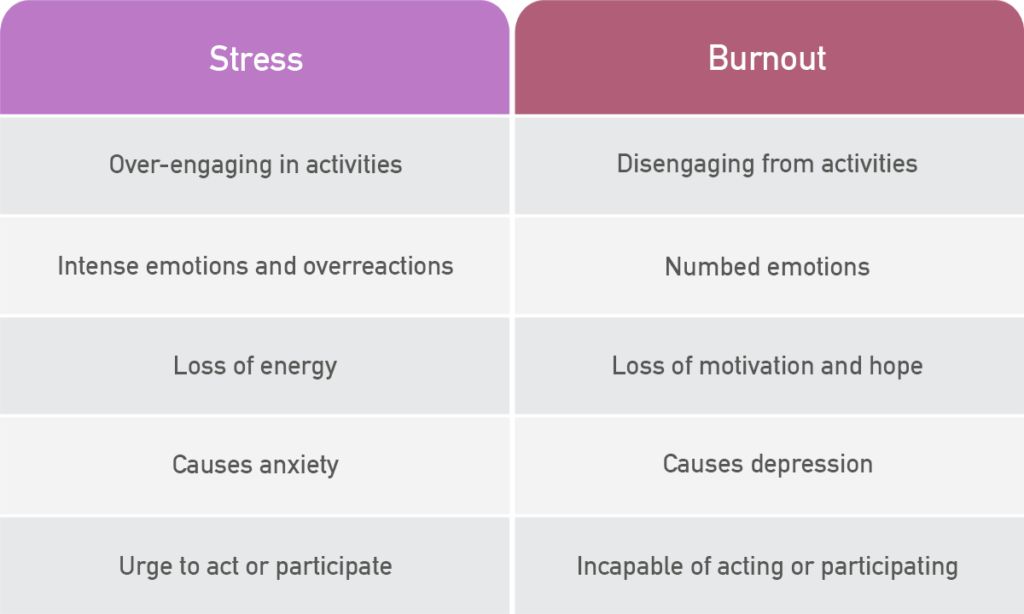
When every day feels like a bad day, painstakingly high exhaustion levels are too familiar, and you just don’t have any more energy to give, there’s no doubt that life appears miserable.
Unfortunately, burnout might be causing that misery.
Indeed, most people experience stress at work or in their family every once in a while, but when stressful situations pass, it’s much easier to regain composure. However, when burned out, that’s not the case.
What is burnout?
Burnout is a psychological syndrome of profound mental exhaustion. It’s caused by consistent exposure to intense stress, which produces psychological and physical issues when out of control.
Burnout is often a direct result of a stressful and unsettling work environment, but it can also emerge from other spheres of life. These can include parenting or caregiving and even romantic relationships.
To evaluate if what you’re experiencing is burnout, you can take a look at the three main attributes that characterize this syndrome:
- Severe exhaustion
- Cynicism and detachment
- Sense of hopelessness and inadequacy
It’s important to note that burnout is not a diagnosable disease. Nevertheless, feelings of immense tiredness and lost satisfaction in what you do ring a warning bell that you might suffer from it.
Stressors at work, such as juggling too many tasks, lack of support and recognition, poorly tailored responsibilities, and an inflexible work environment, are among the most common reasons for burnout.
While any job can cause it, research suggests that healthcare, education, human services (police, social work, etc.), and other people-oriented occupations are more at risk.
Burnout and work
We spend most of our life working – usually from 8 to 12 hours every day, and there’s no wonder that our occupation takes a large (and essential!) chunk of our lives.
But not having strict boundaries toward work and letting it consume you can be a reason you feel burned out.
A poor work-life balance is one of the leading factors that cause burnout, but there are other significant indications that your work environment is the culprit. Ask yourself:
- Do I have any control or influence over my schedule, workload, or assignments?
- Do I know what my superiors expect of me, and am I comfortable with these expectations?
- Do I experience bullying, intimidation, and micromanagement at my job?
- Is my job putting me to extremes? Are monotony or chaos at work a daily occurrence?
- Do I have support from my managers and colleagues?
Think if you are comfortable with your answers. If not, it’s likely that your job has an unhealthy environment and is leading you to burnout.
Should I quit my job?
When resolving your burnout issue, cutting the problem at its root might seem perfect.
Unfortunately, for many people, quitting is not an option – even if you go to work for the sole reason of paying the bills.
If quitting is not an option, try addressing the problems you face at work with your superiors. Open communication about your workload or persistent issues in the office can make a significant difference.
However, note that not only work itself but your personality traits can also contribute to burnout.
Your personality and burnout
Despite what sort of work you do, burnout can affect anyone, and usually, it’s not solely a work issue. Other factors play a large part in causing burnout, including your lifestyle or specific personality traits.
If you feel that you are:
- Taking on too many responsibilities
- Lacking close social relationships
- Not making enough time for socializing and relaxation
- Pessimistic toward self or the world
- Perfectionistic
- In need to be in total control
It could be that your characteristics add up to burnout.
In many cases, how you treat yourself during your downtime tremendously affects how you feel. Long working hours, overcommitting to childcare, an immense amount of household chores, and other responsibilities are a shortcut to burnout.
Hence, finding the balance between working and unwinding is vital since severe burnout can make you loathe everything you do.
However, even if it is your job that causes burnout, it tends to spill outside the work environment – your social life, romantic relationships, parenting, or even an entire lifestyle can also become affected.
Am I stressed or burned out?
Although burnout is usually a result of relentless stress, it is not the same as being under a lot of stress. Generally, being stressed out means having too much on your plate – demanding tasks pressure you into feeling overwhelmed.
However, in the case of burnout, too much becomes too little.
Burnout makes you feel empty: you lack the motivation to do the simplest tasks, feel hopeless, and life, in general, seems grim.
To better understand how stress differs from burnout, imagine a plant that needs watering. You give the plant too much water. It will put the plant under a lot of stress and limit its potential growth, but it will recover.
But if you stop watering it altogether and place it in direct sunlight, it will dry out completely – it might be tough to revive that precious plant then.
Here’s a side-by-side comparison of stress and burnout symptoms:

Signs to look out for
While the main symptoms of burnout are exhaustion and negative feelings toward work and other areas of life, other lesser-known signs could indicate you’re burned out.
Since this syndrome affects how you feel in various ways, you can experience both somatic and emotional symptoms, such as:
- Sleep issues or insomnia
- Unexplained regular headaches, stomach pains
- High blood pressure
- Concentration problems
- Loss of interest in liked activities
- Feeling worthless
- Food, alcohol, or substance abuse
- Weakened immune system
- Crippling sadness, anger, or irritability
If you notice these symptoms, consult your medical practitioner to relieve them and start treating your burnout immediately.
How to resist and prevent burnout
If your gut is telling you that your symptoms check out for burnout, don’t try to push through the breaking point.
Ignoring it can only cause more damage – untreated burnout worsens over time, and you should take action immediately.
While experiencing burnout symptoms is alarming, several techniques can help you fend off burnout and prevent it in the future.
1. Reach out to others
When life appears gloomy, there’s little appetite for caring, so social relationships can be more exhausting than refreshing.
But humans are social creatures – we crave interactions with others, and they also positively affect us. Having someone you can vent to or ask for advice is one of the biggest joys in life.
You don’t have to suffer and deal with your problems alone – opening up to someone relieves your nervous system and strengthens your relationship with a person.
Friendships at work can also tremendously boost your mood and ward off burnout. Your coworkers likely share similar experiences to yours; hence, socializing or making plans with them after work can make your work days more pleasurable.
However, you probably shouldn’t talk to some people that do nothing but complain. You don’t need their negativity in your life – limit interactions with cranky people. They will only make your mood worse.
2. Reevaluate how you perceive work
Terrible working conditions make work appear bleak, but even the best jobs can begin to look pointless when burnout affects your mindset.
Many people work for the sole reason of putting bread on the table instead of fulfilling their career goals. However, if you find yourself unable to switch jobs right now, you can try to look for some positives in your current one.
Even the most mundane jobs have a larger purpose.
Does your job provide a much-needed service or product? Maybe you work to ensure safety and comfort for others? It doesn’t matter whether you’re a nurse, a janitor, an accountant, or an intern – your role exists for a reason, and you are the person helping to achieve the big things.
It’s also vital to find the balance between work and personal life. If your job does not satisfy you, look for it elsewhere – your family and friends, hobbies, and even volunteering can be your highlights.
Also, don’t forget to take breaks from work. You are entitled to days off – use them to recharge your batteries.
3. Find time for yourself
Work does swallow a lot of our time, and, in a way, we identify ourselves through our profession. However, that doesn’t mean it has to become our whole personality.
You are unique: you have personal interests, hobbies, and things to say outside of work, so nourish that side of yourself.
Dedicate time for new or abandoned hobbies and let your creativity or passions flourish: dance, read a book, play your favorite sport, or maybe knit a sweater. Activities unrelated to your job will help you relax and unwind.
Studies show that physical activity can also be beneficial when dealing with burnout. Pick an exercise you like – if you hate running, some yoga or a peaceful walk around the block can boost your mood and ease the stress just as well.
Don’t forget to set a time for relaxation! Put away your devices, engage in meditation or deep breathing exercises, and let your body and mind relax. But most importantly – get enough sleep every night.
Overcoming your burnout
Burnout doesn’t happen overnight, and neither does the healing from it. And dealing with it alone can be overwhelming and even impossible.
But by following a consistent plan that:
- Pinpoints your causes of burnout
- Provides instant relief and long-term solutions
- Helps create healthy routines and boundaries
You can overcome your burnout and enjoy your life (and work!) to the fullest again. Shift your mental well-being for the better – claim your personalized burnout treatment plan below!
Frequently Asked Questions
How do you know if you’re burned out?
Burnout is a state of emotional, physical, and mental exhaustion caused by prolonged or excessive stress. It can manifest in various ways, including:
- Emotional symptoms: Feeling overwhelmed, helpless, cynical, and hopeless
- Physical symptoms: Fatigue, muscle tension, headaches, and sleep disturbances
- Cognitive symptoms: Difficulty concentrating, making decisions, and remembering things
- Behavioral symptoms: Avoiding work or social activities, withdrawing from relationships, and engaging in unhealthy coping mechanisms
If you experience several of these symptoms for an extended period, it’s possible that you’re experiencing burnout
What does burnout do to your body?
Burnout can have a significant impact on your physical health. Chronic stress can lead to:
- Impaired immune system: Your body becomes less effective at fighting off infections and other illnesses.
- Digestive issues: Stress can cause changes in gut bacteria, leading to problems like diarrhea, constipation, and irritable bowel syndrome (IBS).
- Heart problems: Chronic stress can increase your risk of heart disease by raising blood pressure and cholesterol levels.
- Sleep disturbances: Difficulty falling asleep, staying asleep, or waking up feeling unrested can contribute to burnout and make it difficult to cope with stress.
What is the body’s response to burnout?
When you experience stress, your body releases hormones like cortisol and adrenaline to help you cope with the situation. However, when stress becomes chronic, these hormones stay elevated, leading to a number of negative effects on your body.
Your body also starts to produce less of the hormones that promote relaxation and rest, such as melatonin and serotonin. This imbalance can contribute to sleep problems, anxiety, and mood swings.
What is the fastest way to cure burnout?
There is no one-size-fits-all solution for burnout, as the best approach will vary depending on the individual’s unique circumstances. However, some general strategies that can help include:
- Identify and address the underlying stressors: This could involve reducing your workload, delegating tasks, or setting better boundaries.
- Prioritize self-care: Make time for activities that promote relaxation and well-being, such as exercise, meditation, or spending time in nature.
- Establish healthy sleep habits: Aim for 7-8 hours of quality sleep each night and create a relaxing bedtime routine.
- Seek professional help: If you’re struggling to cope with burnout on your own, consider seeking therapy or counseling from a mental health professional.
Remember, recovery from burnout takes time and effort. Be patient with yourself and focus on making gradual changes that will help you regain your physical, mental, and emotional balance.
What can I do to prevent burnout in the first place?
Prevention is the best way to avoid burnout. Here are some proactive strategies to consider:
- Manage your workload: Avoid taking on too much and learn to delegate tasks effectively.
- Set realistic goals: Break down large projects into smaller, more manageable steps.
- Protect your time: Schedule time for yourself and avoid letting work or other commitments encroach on your personal time.
- Practice self-care: Make time for activities that promote relaxation and well-being, such as exercise, hobbies, and spending time with loved ones.
- Seek support: Build a strong support network of friends, family, or colleagues who can provide encouragement and understanding.
By recognizing the signs of burnout, taking steps to address stress, and adopting preventive measures, you can maintain your well-being and prevent burnout from taking over your life.





